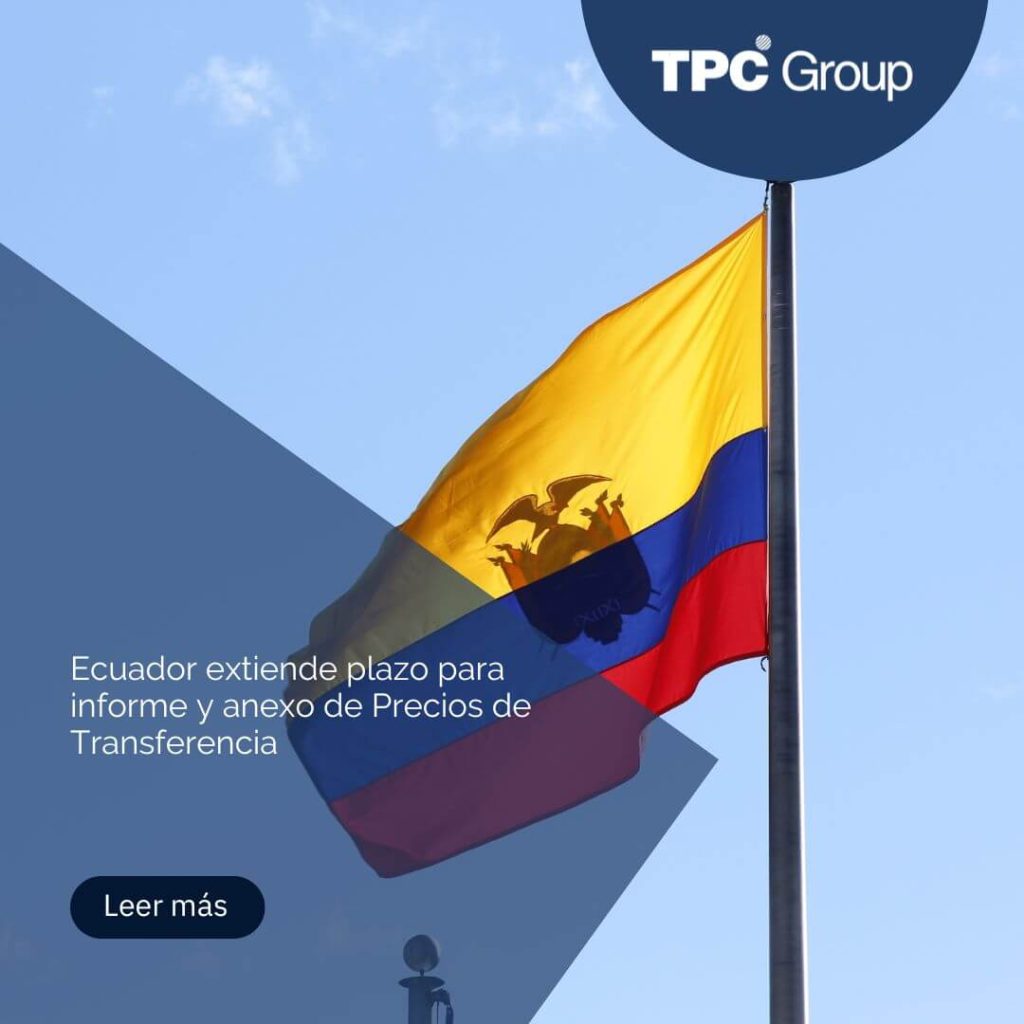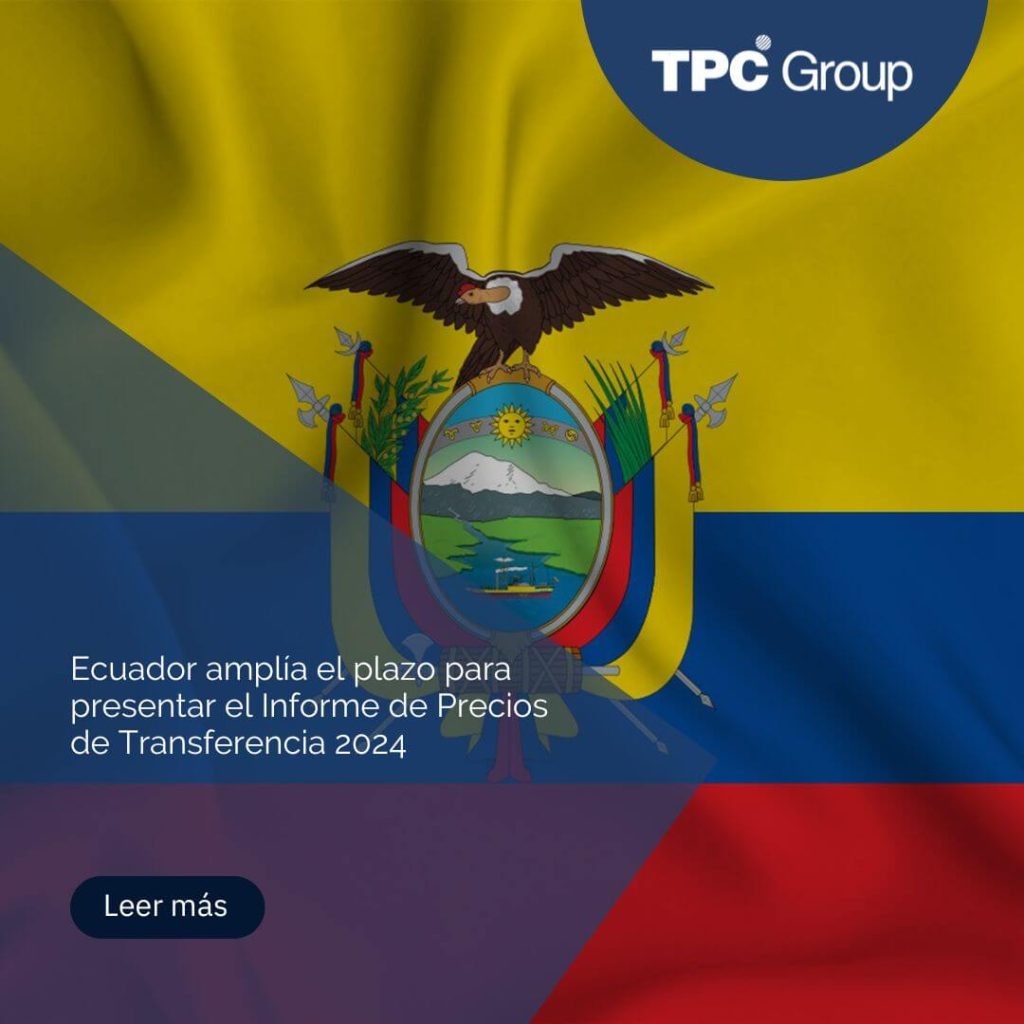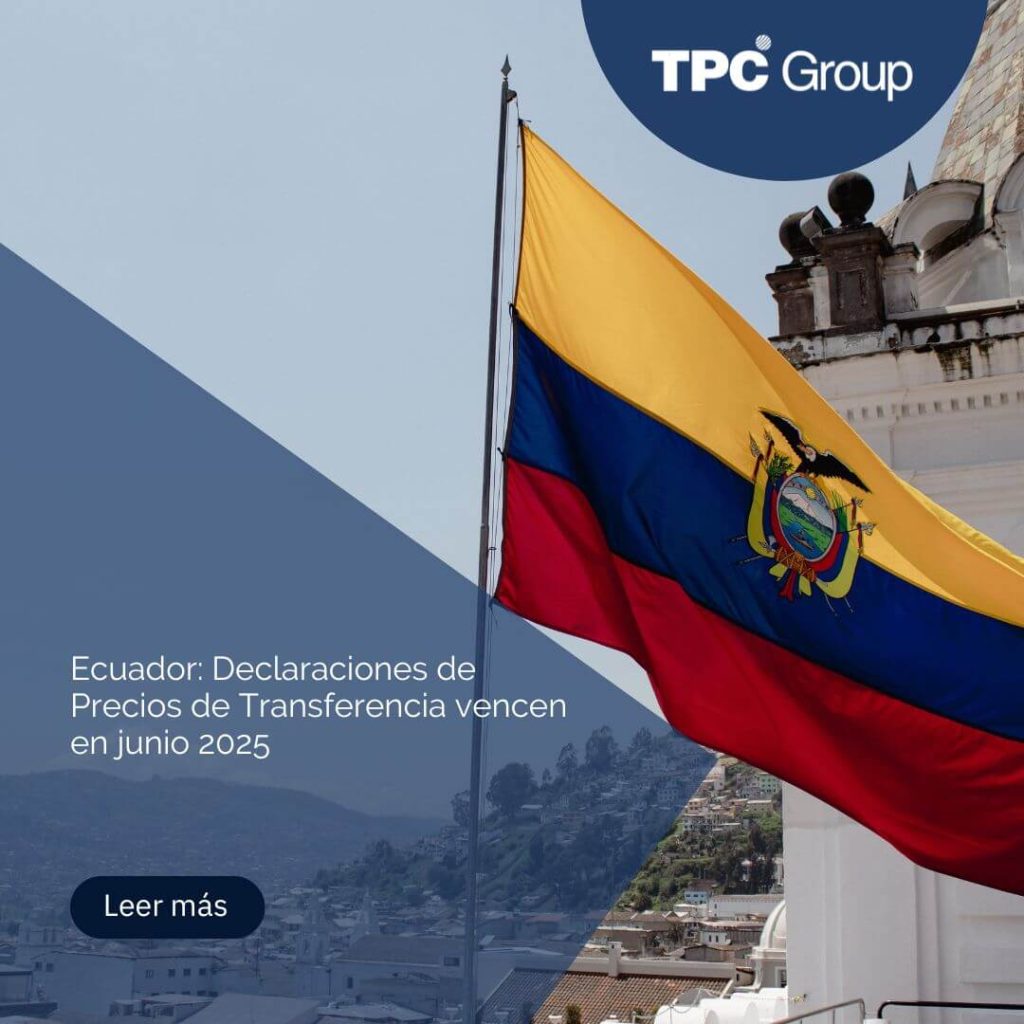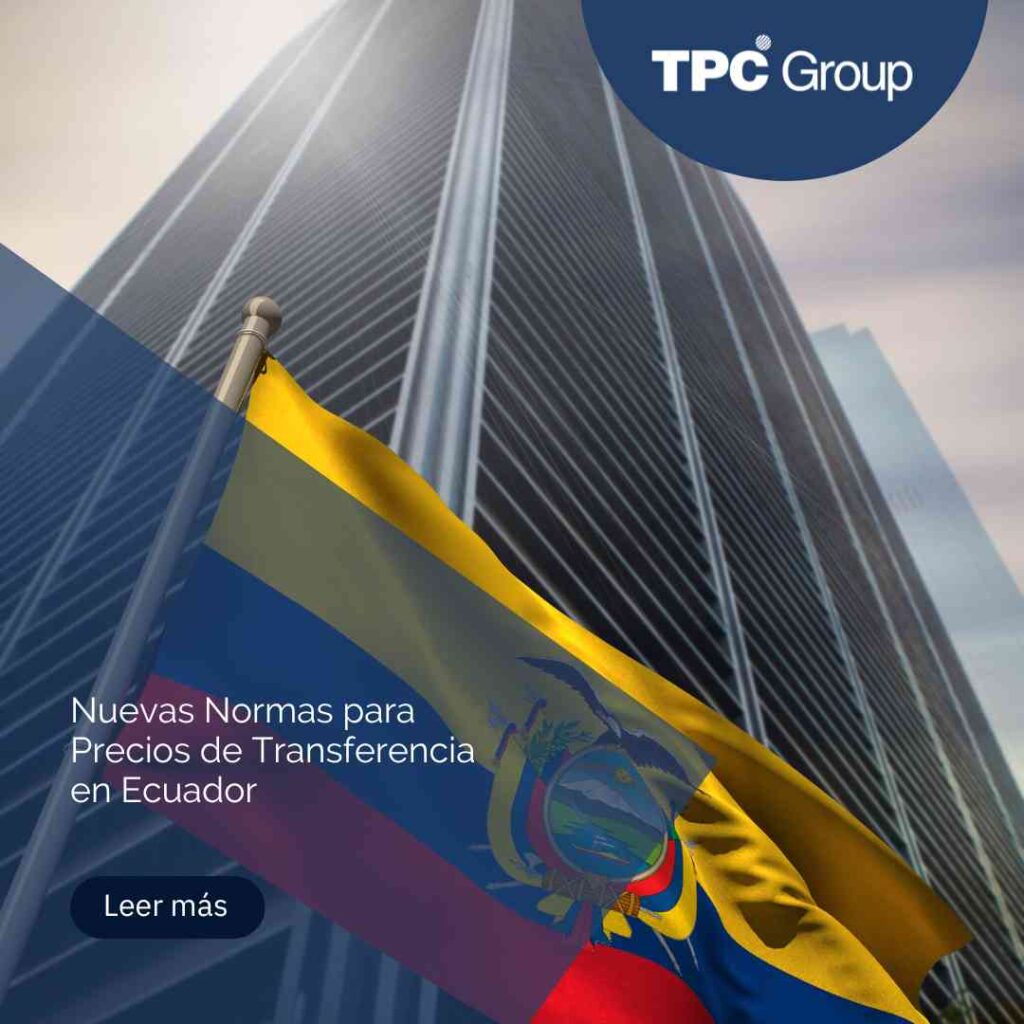Concepto y Regulación en Ecuador
Los Precios de Transferencia en Ecuador se encuentran regulados en su Ley Orgánica del Régimen Tributario Interno o LORTI. A continuación, se mostrará una breve mirada a la normativa de precios de transferencia en este país, en cuanto a sus definiciones, supuestos de vinculación, obligados a la declaración jurada informativa y al informe integral, así como las sanciones respectivas.
A medida que el mundo globalizado avanza, las operaciones intercompany se han vuelto cada vez más repetitivas y con ello han tomado una mayor importancia los temas vinculados a precios de transferencia.
Principio de Plena Competencia
De acuerdo al artículo innumerado posterior al artículo 15 de la LORTI se establece el principio de plena competencia de la siguiente manera:
«Para efectos tributarios se entiende por principio plena competencia aquel por el cual, cuando se establezcan o impongan condiciones entre partes relacionadas en sus transacciones comerciales o financieras, que difieran de las que se hubieren estipulado con o entre partes independientes, las utilidades que hubiere sido obtenidas por una de las partes de no existir dichas condiciones pero que, por razón de la aplicación de esas condiciones no fueron obtenidas, serán sometidas a imposición» – Artículo agregado por Art. 78 de Decreto Legislativo No. 000.
Este principio también denominado como »Principio de Arm’s Length« tiene como fundamento que los precios pactados entre partes relacionadas sean consistentes a los que hubiesen pactado empresas independientes.
Criterios para identificar empresas relacionadas o vinculadas
Acorde a lo establecido en la LORTI, se entiende como partes relacionadas a la personas naturales o sociedades, en las que:
- Cuando una persona natural o sociedad sea titular directa o indirectamente del 25% o más del capital social o de fondos propios en otra sociedad.
- Las sociedades en las cuales los mismos socios, accionistas o sus cónyuges, o sus parientes hasta el cuarto grado de consanguinidad o segundo de afinidad, participen directa o indirectamente en al menos el 25% del capital social o de los fondos propios o mantengan transacciones comerciales, presten servicios o estén en relación de dependencia.
- Cuando una persona natural o sociedad sea titular directa o indirectamente del 25% o más del capital social o de los fondos propios en dos o más sociedades.
- Cuando una persona natural o sociedad, domiciliada o no en el Ecuador, realice el 50% o más de sus ventas o compras de bienes, servicios u otro tipo de operaciones, con una persona natural o sociedad, domiciliada o no en el país. Para la consideración de partes relacionadas bajo este numeral, la Administración Tributaria deberá notificar al sujeto pasivo, el cual, de ser el caso, podrá demostrar que no existe relacionamiento por dirección, administración, control o capital.
Métodos de Precios de Transferencia Ecuador
Según el Artículo 85 del RLRTI, para determinar los precios de las operaciones entre partes relacionadas, que, reflejen en el principio de plena competencia, se puede utilizas cualquiera de los siguientes métodos:
- Método de Precio Comparable No Controlado (MPCNC)
- Método del Precio de Reventa (MPR)
- Método del Costo Adicionado (MCA)
- Método Residual de Reparto de Utilidades (MDU)
- Método de los Márgenes Transaccionales de Utilidad de la Operación (MMTUO)
Criterios de Comparabilidad en Ecuador
Acorde a la Sección Segunda de la LORTI para determinar si una operación es comparable se deberá tener en consideración, los siguientes criterios:
- Las características de las operaciones.
- El análisis en base a funciones, activos y riesgos.
- Los términos contractuales.
- Las circunstancias de mercado o económicas que afectaron la operación.
- Las estrategias de negocios, incluyendo las relacionadas a la penetración, permanencia y ampliación de mercado.
Documentación formal solicitada por la autoridad
La legislación ecuatoriana en materia de precios de transferencia prevé dos tipos de obligaciones formales, a fin de que se demuestre que los precios acordados entre partes relacionadas se encuentran acorde al principio de plena competencia.
De acuerdo al artículo 84 del RLRTI y del artículo segundo de la Resolución NAC-DGERCGC15-00000455, publicada en mayo de 2015, reformada por la por la NAC-DGERCGC23-00000025, los contribuyentes que hayan realizado transacciones con partes vinculadas que superen los umbrales establecidos en esta, estarán obligados a presentar determinados documentos (como es el caso del Anexo de Operaciones con Partes Relacionadas), así como de corresponder el Informe de Precios de Transferencia.
-
Declaración Jurada Informativa de Precios de Transferencia
Acorde a las normas señaladas, los contribuyentes que mantengan, durante un ejercicio fiscal, transacciones con partes relacionadas por un monto mayor a tres millones de dólares americanos, se encontrarán obligados a presentar el Anexo de Operaciones con Partes Relacionadas.
Dicho Anexo deberá ser llenado teniendo en cuenta las consideraciones señaladas en la Ficha Técnica publicada por el SRI (actualmente en su versión 8 de noviembre del 2023), la cual describe aspectos del contenido de este, tales como información relacionada al contribuyente, a sus partes vinculadas y el detalle de las operaciones realizadas.
-
Estudio Técnico de Precios de Transferencia
Se encontrarán obligados a presentar adicionalmente al Anexo, el Informe Integral de Precios de Transferencia (Estudio), aquellos contribuyentes cuyos montos por operaciones con partes vinculadas superan los 15 millones de dólares americanos, durante un mismo ejercicio fiscal.
El referido Informe deberá ser presentado siguiendo las especificaciones contenidas en la Ficha Técnica para la Estandarización del Análisis de Precios de Transferencia.
-
Fecha de Presentación
Tanto el Anexo de Operaciones con Partes Relacionadas como el Informe Integral, se deberán presentar en un plazo que no exceda los dos (2) meses después de la presentación de la DJ Anual de Renta, conforme el último dígito del RUC.
Vencimiento de precios de transferencia en Ecuador
Art. 84.- Presentación de Información de operaciones con partes relacionadas.
Los sujetos pasivos del Impuesto a la Renta, que realicen operaciones con partes relacionadas, y no se encuentren exentos del régimen de precios de transferencia de conformidad con el artículo innumerado quinto agregado a partir del artículo 15 de la Ley de Régimen Tributario Interno, de acuerdo al artículo correspondiente a la Ley de Régimen Tributario Interno, adicionalmente a su declaración anual de Impuesto a la Renta, presentarán al Servicio de Rentas Internas el Informe Integral de Precios de Transferencia y los anexos que mediante Resolución General el SRI establezca, referente a sus transacciones con estas partes, en un plazo no mayor a dos meses a la fecha de exigibilidad de la declaración del impuesto a la renta, de conformidad con lo dispuesto en el artículo correspondiente en este reglamento.
| Si el noveno dígito de RUC es | Fecha de vencimiento de la Declaración de la Renta (hasta el día) | Fecha de vencimiento de la Declaración de Precios de Transferencia (hasta el día) |
|---|---|---|
| 1 | 10 de marzo 2024 | 10 de mayo 2024 |
| 2 | 12 de marzo 2024 | 12 de mayo 2024 |
| 3 | 14 de marzo 2024 | 14 de mayo 2024 |
| 4 | 16 de marzo 2024 | 16 de mayo 2024 |
| 5 | 18 de marzo 2024 | 18 de mayo 2024 |
| 6 | 20 de marzo 2024 | 20 de mayo 2024 |
| 7 | 22 de marzo 2024 | 22 de mayo 2024 |
| 8 | 24 de marzo 2024 | 24 de mayo 2024 |
| 9 | 26 de marzo 2024 | 26 de mayo 2024 |
| 0 | 28 de marzo 2024 | 28 de mayo 2024 |
Puede leer más detalles sobre la fecha de vencimiento.
Obligados a presentar documentación de Precios de Transferencia
Que mediante la Resolución No. NAC-DGERCGC16-00000532 publicada en el Sexto Suplemento del Registro Oficial No. 913 de 30 de diciembre de 2016, el Servicio de Rentas Internas estableció las normas técnicas para la aplicación del régimen de precios de transferencia.
| Informes | Corresponde |
|---|---|
| Declarar que existen operaciones con relacionadas en las casillas correspondientes del formulario de la declaración del impuesto a la renta | Si la Compañía presenta transacciones con vinculadas independientemente del monto de estas. |
| Anexo de Operaciones con Partes Relacionadas | Operaciones con partes relacionadas en un monto acumulado superior a tres millones de dólares de los Estados Unidos de América (USD 3.000.000,00). |
| Informe Integral de Precios de Transferencia | Si el monto es superior a diez millones de dólares de los Estados Unidos de América (USD 10.000.000,00). |
Sujetos No Obligados al Régimen de Precios de Transferencia en Ecuador
La Normativa Tributaria señala que los contribuyentes que realicen transacciones con partes vinculadas se encuentran fuera del ámbito del régimen de precios de transferencia en el caso que:
- Cuando la cuota íntegra supere el 3% de su base gravable.
- No tengan transacciones con residentes en Paraíso Fiscal o regímenes de baja o nula imposición tributaria.
- No tengan con el Estado compromisos contractuales, respecto de la exploración y explotación de recursos no renovables.
Lineamientos OCDE
Si bien Ecuador no forma parte de los países miembros de la OCDE, sigue como referencia técnica para lo dispuesto en la legislación de precios de transferencia, a las «Directrices en Materia de Precios de Transferencia a Empresas Multinacionales y Administraciones Tributarias« aprobadas por esta organización, vigentes al 1 de enero del período fiscal correspondiente.
Sanciones por Incumplimiento
Las normas de precios de transferencia prevén una sanción en caso de no presentar el Informe de Precios de Transferencia o el Anexo de Operaciones con Partes Relacionadas, así como si son declaradas con forma inexacta.
De acuerdo a la LORTI, y el RLRTI en sus Artículos 22º y 84 respectivamente, la infracción comentada será sancionada con una multa de hasta 15 mil dólares americanos.






